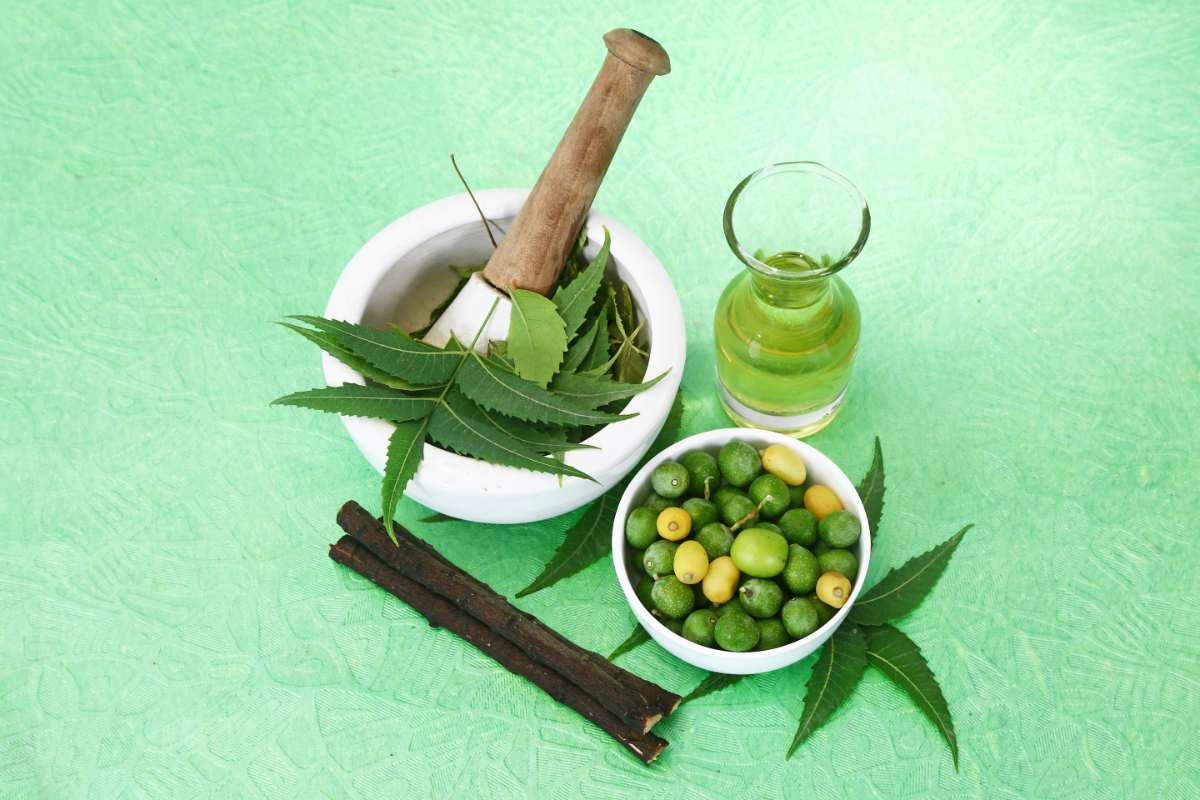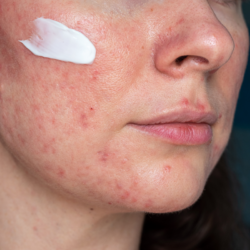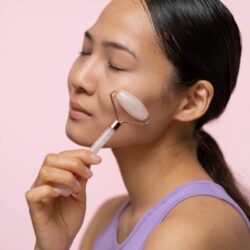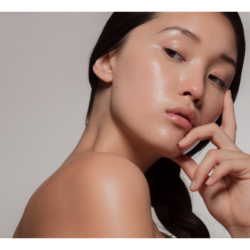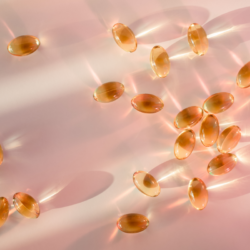Ayurveda is a traditional Indian medicine that uses herbs, spices and oils to improve health and well-being. Using the principles of Ayurveda, you can take care of your skin in a natural and effective way. In this article, we’ll explore how to improve skin health with ayurveda and the key principles for taking care of yourself naturally.
What are the principles of ayurveda for healthy skin?
According to Ayurveda, each person has a unique constitution, called a“dosha“. The three doshas are Vata, Pitta and Kapha, and each dosha has unique characteristics that can affect skin health. To care for your skin naturally, it’s important to understand your dosha constitution and choose skincare products that match your unique needs.
Firstly, the use ofoils is a key element of ayurvedic skin care. These oils deeply nourish the skin and can help to reduce dryness inflammation and signs of ageing. Oils commonly used in Ayurveda include coconut oil, sesame oil and sweet almond oil.
Secondly, herbs and spices. Ayurveda also uses them to improve skin health. Some herbs commonly used in skin care include neem, turmeric and fenugreek. These herbs can help reduce inflammation, soothe the skin and improve skin texture and radiance.
Thirdly, the role of diet. Diet plays a key role in skin health according to Ayurveda. In fact, foods that are considered beneficial for the skin include green leafy vegetablesfresh fruit, nuts and seeds. It is also advisable to avoid processed foods, fried foods and foods rich in sugar.
How do you determine your doshic profile?
To determine your doshic constitution in Ayurveda, it is advisable to consult a qualified Ayurveda practitioner. This health professional will be able to help you identify your constitution type on the basis of several criteria, including :
- Your physique: your height, weight, body shape and face.
- Your temperament: your food preferences, your energy level, the way you think and react.
- Your current state of health: your physical symptoms, illnesses and emotional state.
The Ayurveda practitioner may use a questionnaire or observation to determine your doshic constitution. He or she may also examine your tongue, pulse and eyes to identify your type of constitution.
Once you have identified your doshic constitution, the ayurvedic practitioner can recommend foods, herbs and oils that are best suited to your skin type and state of health.
What are the different types of doshic constitution ?
According to ayurveda, there are three types of doshic constitution, known as the three doshas. Each dosha has unique characteristics that affect the health of the skin, as well as the overall health of the individual. The three doshas are :
- Vata: this is the dosha associated with air and ether. People with a dominant Vata constitution tend to have dry, thin and cold skin, and can be prone to peeling, premature wrinkles and eczema.
- Pitta: this is the dosha associated with fire and water. People with a dominant Pitta constitution tend to have sensitive skin, prone to redness, acne and age spots.
- Kapha: This is the dosha associated with water and earth. People with a dominant Kapha constitution tend to have oily, thick and shiny skin, and may be prone to acne, blackheads and eczema.
It is important to understand that each person has a unique combination of the three doshas, and that the doshas can fluctuate depending on the environment, stress and other factors. By understanding your own doshic constitution, you can choose the skincare products and eating habits that best suit your unique needs.
Our opinion on ayurveda for skin care
As a natural health professional, I’m convinced that Ayurveda is an effective way of looking after your skin naturally and holistically. By understanding your own doshic constitution and using the right oils, herbs and diet, you can significantly improve the health and appearance of your skin.
Ayurveda offers a complete approach that considers the individual as a whole and focuses on thebalance between body, mind and environment. Unlike cosmetics, which can contain harsh chemicals, ayurveda uses natural ingredients to deeply nourish and regenerate the skin.
However, it’s important to stress that Ayurveda is a complex practice that requires a thorough understanding of the fundamental principles of this traditional medicine. For this reason, I strongly recommend consulting a qualified practitioner before embarking on an Ayurvedic skin treatment.
In conclusion, if you’re looking for a natural and effective way to care for your skin, Ayurveda is an option to seriously consider. By following the principles of this age-old practice, you can improve the health of your skin in a lasting way, while avoiding harsh chemicals and invasive procedures.
Ayurveda in the treatment of Verneuil disease
Ayurveda could potentially help with Verneuil disease, but it is important to consult a qualified healthcare professional to assess the situation and determine the appropriate treatment. Here are some Ayurvedic approaches that may be beneficial for people with this condition:
- Diet: Ayurveda recommends a balanced diet to reduce inflammation and promote healing. Anti-inflammatory foods such as green vegetables, fruit, nuts and seeds may be beneficial. It is also important to avoid irritating foods such as fried foods, dairy products, refined sugar and processed foods.
- Medicinal plants: Some Ayurvedic plants, such as turmeric, neem, aloe vera and boswellia, have anti-inflammatory and antimicrobial properties that may help relieve the symptoms of Verneuil disease.
- Stress management: Stress can aggravate inflammation and the symptoms of Verneuil disease. Ayurveda offers relaxation techniques, such as meditation, yoga and deep breathing, to help manage stress and promote healing.
- Detoxification therapies: Ayurveda includes several purification therapies, such as Panchakarma, which aims to eliminate toxins from the body and restore the balance of the doshas.
However, it is important to note that Ayurveda should not replace conventional medical treatments for Verneuil disease. It can be used in addition to treatments prescribed by a doctor to help relieve symptoms and improve the quality of life of people suffering from this disease. It is essential to consult a healthcare professional before undertaking any alternative or complementary treatment.
FAQ
- What is Ayurveda?
Ayurveda is a traditional system of medicine originating in India. It is based on holistic practices and aims to maintain a balance between mind, body and soul.
- What are the practices of Ayurveda?
Ayurveda practices include the use of medicinal plants, yoga, meditation, massage, diet and body cleansing.
- Is Ayurveda effective in treating illness?
Ayurveda is often used to treat a variety of illnesses, but it is important to note that it should not be used as a substitute for conventional medicine. It is important to consult a doctor before starting any Ayurvedic treatment.
- Do Ayurvedic treatments have side effects?
All Ayurvedic treatments can have side effects, depending on the plants used and the practices followed. It is important to follow the instructions of a qualified practitioner to minimise the risks.
- Is Ayurveda suitable for everyone?
Ayurveda is a holistic system of medicine that can benefit anyone seeking to improve their overall well-being. However, it may not be suitable for everyone, particularly those suffering from certain chronic illnesses. It is important to consult a qualified practitioner to determine whether Ayurveda is suitable for your needs.
- Can the principles of Ayurveda be used to treat Verneuil disease?
Ayurveda is a traditional Indian medicine that dates back thousands of years and relies on balancing the body’s energies (doshas) to maintain or regain health. Verneuil disease, also known as hidradenitis suppurativa, is a chronic inflammatory skin disease that affects the sweat glands and hair follicles.
References

